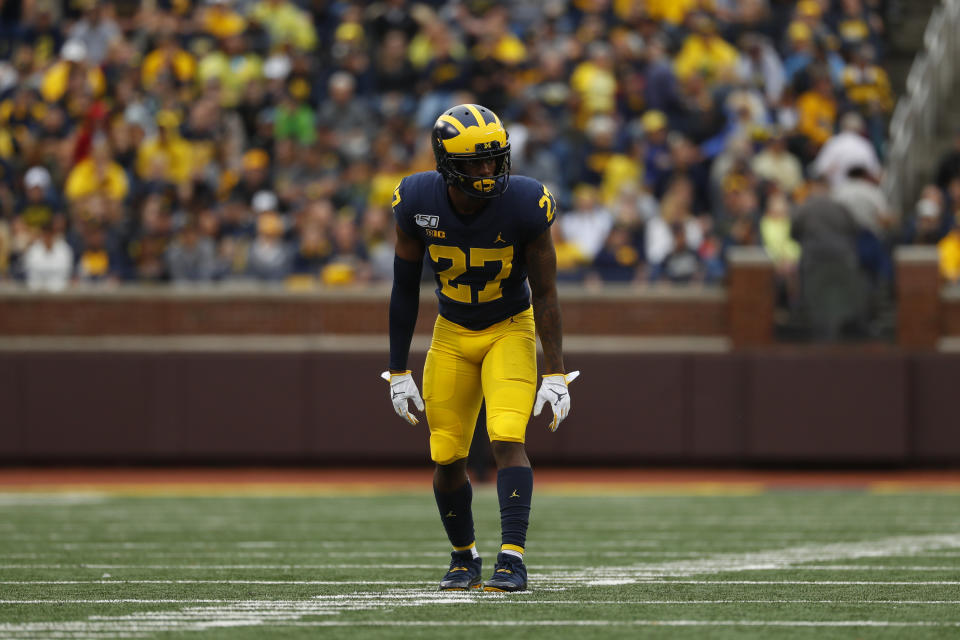‘Together, our voice is stronger’: The origins and aims of an unprecedented college athlete coalition
The most expansive and diverse coalition of college athletes ever assembled was built, in the beginning, to further a dialogue. Not to fight for economic liberty, nor to push for safer coronavirus protocols, as the group did Wednesday. No, College Athlete Unity formed, in the days after George Floyd’s murder, because racial injustice, they agreed, can’t be undone by moments.
“We saw all the conversations surrounding Black Lives Matter,” Michigan cornerback Hunter Reynolds says. “We” is he and some current and former teammates. “We wanted to do something that would continue that conversation in the months after it died down. Because we feel like, in America, a lot of things are trends. We didn't want the civil rights of people to be a trend.”
So they began talking, and listening, and brainstorming. They knew, as football players who regularly perform in front of 100,000 fans, with millions more watching on TV, that they had a platform. “An opportunity to speak on these things, and reach a wide audience,” Reynolds says.
What they found in discussions with one another, and eventually with athletes nationwide, was far more powerful.
“Together,” Reynolds says, “our voice is much stronger.”
That’s the idea behind CAU, an empowerment group that now represents college athletes across 23 sports and 30 conferences. Throughout 150 years of college football, player platforms have rarely been unified. Voices have been suppressed, confined to their respective programs. Athlete advocacy groups have sprouted on campuses, but rarely as national networks.
This summer, Reynolds and Benjamin St-Juste, a former Wolverine who’d transferred to Minnesota, sought to change that. They contacted peers, who contacted their peers. The group looped in team leaders around the Big Ten, and athletes who’d been vocal about injustices anywhere. “It kind of created this web,” Reynolds says. He and teammates had always thought to themselves: “I'm going through X, Y and Z.” They never consciously asked: “What is an athlete in Oregon, or an athlete in Alabama, or an athlete in Texas – what are they going through? Are they going through X, Y and Z as well?”
“When you reach out to them, you realize, OK, we're kind of all in the same boat here, we're just in different places,” Reynolds says. “Once you realize that, it makes it so much easier to work together.”

CAU realized, for example, that Pac-12 players had been organizing as well, and that their movement was similarly organic. One former Oregon lineman would call another former Oregon lineman, for example, and they’d find, as Arizona State junior Cody Shear says, that they were “trying to achieve the same thing.” One became a few, a few became a dozen, and a dozen became hundreds threatening to boycott a season if their conference doesn’t change.
CAU’s demands, and tactics, have been different. Early on, the group expanded its focus, beyond racial injustice, to “injustice in general,” Reynolds says. But with Big Ten football rapidly approaching, its first big move was an urgent effort to keep players safe. A core group of around 30 from throughout the Big Ten, all connected via group chat, distributed a form to their respective teammates – roughly 1,000 in total. They formulated and refined a proposal based on players’ concerns. It calls for stronger COVID-19 measures and other protections.
Whether the conference will meet the demands, and what players would do if it doesn't, and whether a season will even happen, remains to be seen. The big-picture objective, however, is already materializing in tiny doses. Reynolds spoke with Big Ten commissioner Kevin Warren before and after the proposal was released. A larger group of football and non-football athletes met with Warren virtually on Monday for over two hours. The commissioner, Reynolds says, has been “real receptive” to players’ voices. And Warren told ESPN: "This is not a one-time question-and-answer period. ... My whole goal is to make sure that our student-athletes feel embraced, empowered, encouraged and they have a platform to speak.”
For decades, college football players haven’t felt that. Many still don’t. They aren’t supposed to speak on their own terms. Problems, from safety concerns to abusive coaches, are considered localized problems, to be dealt with internally. “Leadership councils” and “student-athlete advisory committees” only have say when the establishment gives it to them.
What players have come to understand this summer, though, is that many localized problems are also systemic and interconnected, tied together by pervasive top-heavy power dynamics — “that a lot of us have similar concerns and similar issues,” as Reynolds says — and that the best way to address them is to unite and address the system. To seize seats at the proverbial table. “As college athletes, we're the primary stakeholders in the business of college sports,” Reynolds says. “So we just feel that it's necessary for any conversation to include us.”
If and when they are included, College Athlete Unity will have multiple dialogues to further. Its work won’t end when the pandemic does. Reynolds has two more years of eligibility. “I hope when I'm gone,” he says, “that there's a new batch of college athletes that can take over and kind of keep the whole country unified to address anything that needs to be addressed.
“And we hope,” he later continues, “that through people seeing what we've done so far, we can only continue to grow. And more and more people can feel comfortable speaking out and voicing their opinions – because they know that there are people around the country who feel the same way.”
More from Yahoo Sports:

